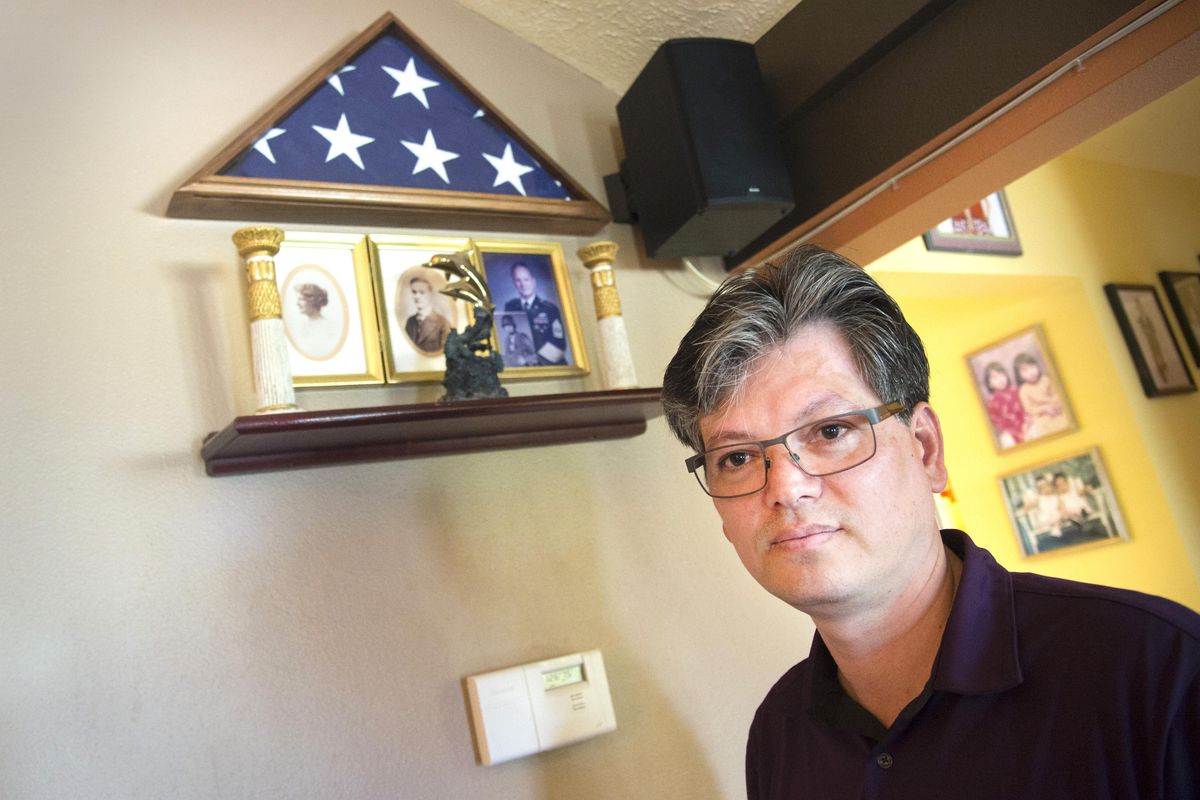Children of the Vietnam War spent decades finding American fathers

Jimmy Miller’s Spokane Valley home prominently displays photos of his father in uniform, as well as the U.S. flag given to the family after his father’s death in 1996.
Miller was born in Vietnam on Dec. 25, 1967 to James A. Miller, a member of the 82nd Airborne Division, and a Vietnamese mother. Though the couple married, they were separated by war. Miller’s father tried to find him, but their reunion took 27 years.
The younger Miller, now 48, had searched too, after immigrating in 1990 to Spokane with his Vietnamese mother and siblings under the Amerasian Homecoming Act, which allowed about 23,000 Amerasians and 65,000 family members to settle in the U.S.
Miller considers himself lucky, despite experiencing hardships growing up. He stayed with family in Vietnam, and a tutor secretly gave him a few home lessons.
Many “children of the dust” fathered by Americans were abandoned, taunted, abused, and left unschooled after the last of the U.S. military departed 41 years ago with the fall of Saigon.
To help the estimated 400 Amerasians remaining in Vietnam, Miller founded a nonprofit called Amerasians Without Borders. Since 2013, the nonprofit has given free DNA testing to Vietnam-based Amerasians. The nonprofit is pressing officials to accept positive DNA results as proof for those who have U.S. visa applications pending further verification, a process Miller says is bogged down in bureaucracy.
“Lucky for me I still had my mother,” Miller said of his own experience. “Many left behind don’t have enough evidence to prove they have an American father. Many of us were orphans after 1975.”
Amerasians Without Borders pays for medical bills and training. It also supports a few immigrants who’ve resettled in Spokane, and Miller has sponsored three families since 2011. Additionally, the group draws about 500 Vietnamese Amerasians to an annual reunion, held July 10 this year in Washington D.C.
Amerasians Without Borders depends on small individual donations – many from Miller himself – to fund its activities.
Miller has scheduled July meetings with Sens. Patty Murray and Maria Cantwell on support for Vietnam-based Amerasians. He plans to see Rep. Cathy McMorris Rodgers in Spokane. Other members of Amerasians Without Borders are meeting with Congressional members, and the group has sent DNA test results to State Department officials.
“Because the test doesn’t lie,” Miller said. “These Amerasians applied legally to try to get here, and they get stopped.”
U.S. families seeking to reunite with Amerasian relatives have sought the group’s support. Vietnam veteran Robert Thedford of Texas worked on paperwork for his son, Vo Huu Nhan, before Thedford died in 2015. His wife continues the correspondence.
Ned Piper, of Longview, Wash., recently learned that DNA testing shows his deceased brother, Perry Rees Piper, is the father of Quoc Van Ngo, 48, in Ho Chi Minh City (formerly Saigon).
“We are now working with Amerasians Without Borders to complete the mountain of paperwork required to bring Quoc and family to America,” Piper said.
In the U.S., Miller hit dead ends trying to find his own father. His sister, then a student at Shadle Park High School, traced James Miller to a Fayetteville, North Carolina phone number.
She called and gave Miller her brother’s phone number, and he called his son. But the older man mispronounced Jimmy Miller’s Vietnamese name, and the younger Miller, assuming it was a telemarketer, hung up.
“About 15 minutes later, he called back; he said, ‘I want to talk to Jimmy,’” Miller said. “I met him in 1995 when I was 27 years old.”
Miller’s mother Phan Kim Chi met his dad in Saigon, and they married in May 1967 before the Tet Offensive. War separated them, and his father later told Miller he asked to return to Vietnam in 1972 to search for his wife and son. Someone told his father that they’d been killed.
“I think after Tet Offensive, he left, and during wartime, my mom said he was injured or something,” Miller said. “My mom didn’t know anything. A few years later she married.”
She had two more children. Fearing the Communist regime, she later burned items relating to Miller, but photos and papers survived with Jimmy Miller’s grandmother. His mom also buried a photo album wrapped in plastic to dig up later.
In 1977, leaders confiscated her Saigon property and sent them to a “new economy zone.” Under tough conditions, she sent the children to live with grandparents. Poverty spread in Vietnam, and people starved, Miller said. After attempting to escape the country by boat, his mother was caught and jailed for five years.
As the family barely survived, mainly fishing, Miller heard cruel words from others about being Amerasian.
“They called us names,” he said. “They said, ‘Go back to your country,’ ‘You’re not part of us.’”
Today, Miller wants to give voice to Amerasians he describes as forgotten in the dialogue on U.S. immigration.
He started the Amerasians group in 2009, and it includes members of Operation Babylift that evacuated more than 3,000 Vietnamese orphans. On a 2005 music album, he sang about the fall of Saigon. Because of the album’s anti-Communist lyrics, he doesn’t feel safe returning to Vietnam.
But he knows of the poverty for Amerasians left behind. Many arrived in America illiterate, unable to pass the U.S. citizenship test, although Americans often assume they became instant U.S. citizens, he said.
A married father of three, Miller gained his U.S. citizenship in 1995 and has worked at Triumph Composite Systems since 1996. His mom, in Spokane, often visits her daughter near Seattle.
Miller cherishes the time he spent with his father, if only for two years. Few Amerasians had such happy reunions.
“My dad even went to a lawyer; he wanted me to get U.S. citizenship from birth,” Miller said. “I said: ‘Dad, I don’t want to be U.S. president, so don’t worry about it.’”